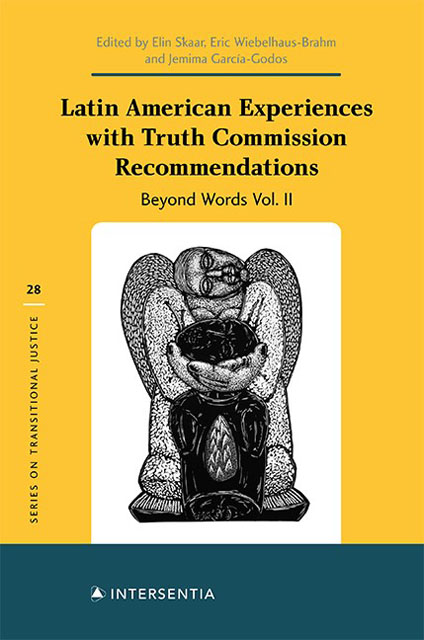Preface
Published online by Cambridge University Press: 19 November 2022
Summary
Truth commissions have become an indispensable part of the transitional justice and peace-building tool-kit in recent years. The anticipated impact of such commissions usually relates to three things: the actual work of the truth commission (in particular, its interaction with victims, perpetrators, and society at large); the issuance of a report; and the implementation of the recommendations made in that report. This latter dimension has attracted comparatively little attention from scholars and practitioners. In fact, we know very little about whether, how, why, and which recommendations are actually implemented and, when they are, with what effect. Yet, truth commission recommendations may be highly significant in shaping how societies heal and develop after periods of repression and/or violent conflict. As such, the fate of recommendations overlaps with good governance and development concerns, among other things.
This volume takes stock of the implementation records of the recommendations made by 13 truth commissions across 11 Latin American countries (Argentina, Chile, Brazil, Ecuador, El Salvador, Guatemala, Haiti, Panama, Paraguay, Peru, and Uruguay) in the period from 1983 through 2017. It is the first book ever to provide a systematic comparative analysis of the entire universe of recommendations made by all formal (i.e., state-sponsored) truth commissions in a geographical region. It also is the first book to include a large selection of little known, under-researched cases like the truh commissions of Ecuador, Haiti, Panama, and Paraguay. These commissions addressed a variety of human rights violations committed in the context of repression by authoritarian regimes and civil war. Some were created in the immediate after math of democratic transition and/or conflict termination; others came years later. This volume, therefore, offers several important innovations for scholars and practitioners concerned with democratization, peace-building, and transitional justice in general and with truth commissions in particular.
The events covered in this volume start with what is arguably the first truth commission in the world, Argentina's Comisión Nacional sobre la Desaparición de Personas (CONADEP). Established right after the country's transition to democratic rule in 1983, CONADEP handed over its famous report, Nunca Más, to the Alfonsín government the following year. Chronologically, the book ends with the politics surrounding the implementation of the Brazilian Comissão Nacional da Verdad 's recommendations after it handed over its final report to then-President, Dilma Rouseff, in December 2014.
- Type
- Chapter
- Information
- Latin American Experiences with Truth Commission Recommendations: Beyond Words Vol. II , pp. v - viiiPublisher: IntersentiaPrint publication year: 2022

